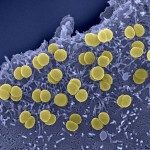Lien vers Pubmed [PMID] – 28368462
Lien DOI – 10.1093/infdis/jix143
J Infect Dis 2017 04; 215(8): 1331-1338
Patients with terminal complement pathway deficiency (TPD) are susceptible to recurrent invasive meningococcal disease (IMD). Neisseria meningitidis (Nm) strains infecting these patients are poorly documented in the literature.We identified patients with TPD and available Nm strains isolated during IMD. We investigated the genetic basis of the different TPDs and the characteristics of the Nm strains.We included 56 patients with C5 (n = 8), C6 (n = 20), C7 (n = 18), C8 (n = 9), or C9 (n = 1) deficiency. Genetic study was performed in 47 patients and 30 pathogenic variants were identified in the genes coding for C5 (n = 4), C6 (n = 5), C7 (n = 12), C8 (n = 7), and C9 (n = 2). We characterized 61 Nm strains responsible for IMD in the 56 patients with TPD. The most frequent strains belonged to groups Y (n = 27 [44%]), B (n = 18 [30%]), and W (n = 8 [13%]). Hyperinvasive clonal complexes (CC11, CC32, CC41/44, and CC269) were responsible for 21% of IMD cases. The CC23 predominates and represented 26% of all invasive isolates. Eleven of the 15 clonal complexes identified fit to 12 different clonal complexes belonging to carriage strains.Unusual meningococcal strains with low level of virulence similar to carriage strains are most frequently responsible for IMD in patients with TPD.

